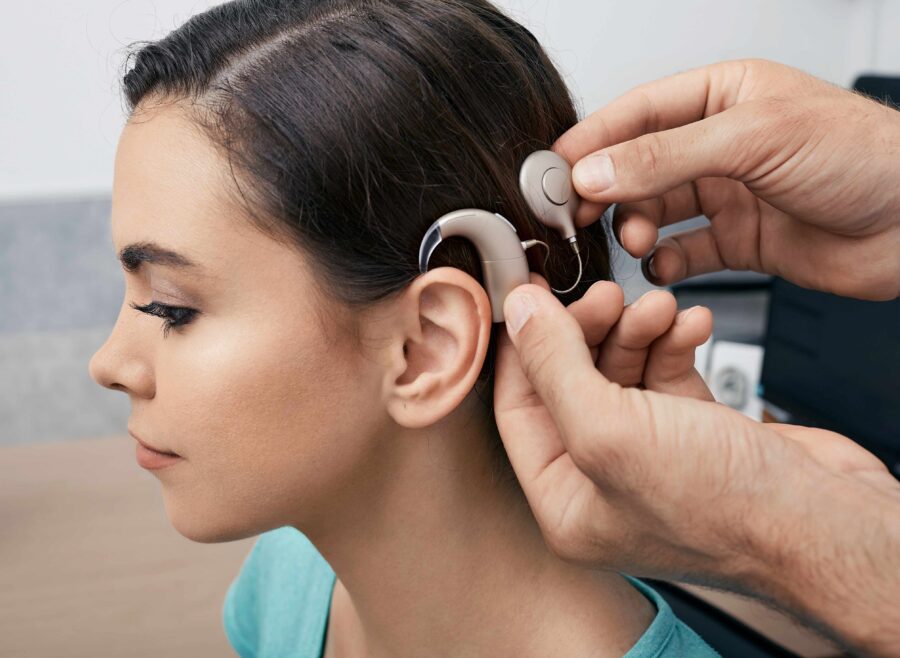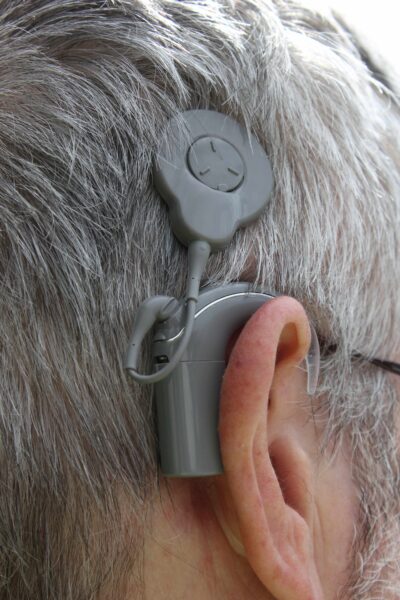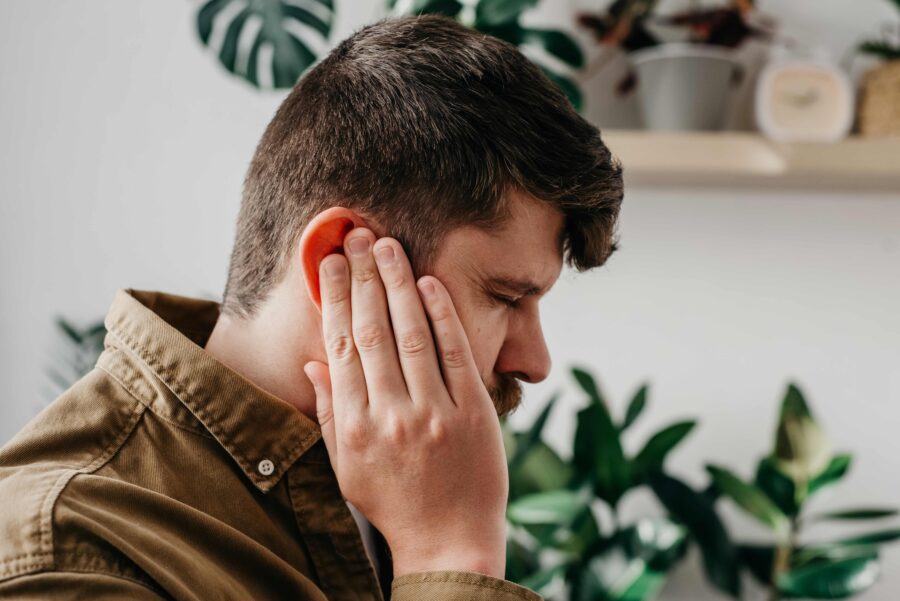Blog post
Cochlear Implants and Hearing Aids: What’s the Difference?
What’s the difference between a cochlear implant and a hearing aid?
Hearing aids and cochlear implants are both designed to help people with hearing loss, but they work in very different ways.
A hearing aid is a small, non-invasive, electronic device worn in or behind the ear that amplifies sound to make it easier for damaged ears to process, whereas cochlear implants bypass the damaged part of the ear entirely, sending sound signals electronically, directly to the sensory part of the ear.
Both options have unique benefits and are suited to different levels and types of hearing loss.

What is a cochlear implant?
A cochlear implant is a small electronic medical device that provides a sense of sound to people with severe to profound hearing loss.
Unlike hearing aids, which make sounds louder, cochlear implants translate sound into electrical signals and then directly stimulate the different regions of the cochlea via an array of surgically implanted electrodes. The wearer does not hear sound as you would know it, instead they receive the impression of the sounds.
Cochlear implants are usually more noticeable than hearing aids, with an external sound processor worn behind the ear or clipped to clothing, and a small coil placed on the scalp to transmit signals to the internal device.

What’s the difference between a bone-anchored hearing aid (BAHA) and a cochlear implant?
Bone-anchored hearing aids (BAHAs) work by transmitting sound vibrations through the skull directly to the inner ear. They are often used by people with conductive hearing loss or single-sided deafness.
Unlike cochlear implants, BAHAs do not use electrodes or direct stimulation of the inner ear. Instead, they are surgically anchored to the bone of the skull and use bone conduction to send the sound directly to the inner ear bypassing any problems in the outer or middle ear.
People often confuse BAHAs with cochlear implants because both are surgically implanted and designed to assist with severe hearing loss, but the mechanisms and candidates for each device are distinct.
Do you need surgery to get a cochlear implant?
Yes, cochlear implants require surgery.
The procedure is typically done under general anaesthesia and involves placing the device under the skin behind the ear and threading electrodes into the cochlea.
The cochlea is a spiral-shaped organ in the inner ear that plays a crucial role in hearing. It contains hair cells that convert sound waves into electrical signals, which are then sent to the brain via the auditory nerve.
In cases of severe hearing loss, these hair cells are often damaged or non-functional, which is why cochlear implants are designed to bypass them and directly stimulate the auditory nerve.
How does a cochlear implant work?
Cochlear implants have two main parts: an external processor and an internal implant.
The external processor, worn behind the ear or clipped to clothing, captures sound using a microphone and converts it into digital signals. These signals are transmitted to the internal implant via a small coil placed under the skin on the scalp.
The internal implant then delivers electrical impulses to the cochlea, stimulating the auditory nerve. The brain receives these impulses and interprets them as sound, allowing the user to perceive a range of noises, from environmental sounds to speech.
This process bypasses the damaged parts of the ear, offering a solution for individuals with severe hearing loss.
What does a cochlear implant sound like?
Initially, sounds from a cochlear implant may seem mechanical or robotic.
However, with time and practice, most users adapt and perceive the sounds as more natural. Hearing therapy often helps with this adjustment process.
How much does a cochlear implant cost?
In the UK, they are available through the NHS for those who meet specific criteria, which usually involves a referral from a GP or an audiologist after a hearing test.
Private clinics also offer cochlear implants, but patients must cover the costs themselves, with costs ranging from £20,000 to £40,000 in the UK.

How long does a cochlear implant last?
The internal implant is designed to last a lifetime, though external components may need replacement or upgrading over time. Regular maintenance ensures the device functions properly.
Similarly, hearing aids are typically designed to last between 3 to 7 years, depending on usage, care and technology advancements, with some users opting for earlier upgrades to access newer features.
Why do some people believe cochlear implants are bad?
Cochlear implants are not inherently “bad,” but they are not suitable for everyone.
They come with risks, such as surgical complications, potential device failures and the possibility that they won’t meet a patient’s expectations. Some people worry that the sound quality might not feel natural or that the implant will not restore hearing to the same level as before hearing loss.
Additionally, there are concerns about the permanence of the surgery, the need for maintenance, and the potential for reliance on external technology.
Cultural factors also play a role; for instance, some members of the Deaf community see cochlear implants as unnecessary. For many in the Deaf community, being deaf is not seen as a disability to be 'cured' but as an integral part of their cultural identity and way of life. Cochlear implants may be viewed as undermining this perspective, especially when introduced to young children before they can decide for themselves. This has led to debates about the ethics of promoting cochlear implants in a way that might prioritise hearing over embracing Deaf culture.
Educating yourself and discussing these concerns with an audiologist can help determine if a cochlear implant is the right choice.
What are the side effects of cochlear implants?
Possible side effects of cochlear implants include dizziness, tinnitus, infection or facial nerve damage.
Most side effects are rare and can often be managed with medical care.
Are cochlear implants better than hearing aids?
It depends on the individual’s hearing loss.
Cochlear implants are better suited for severe to profound hearing loss where hearing aids are no longer effective. For mild to moderate hearing loss, hearing aids are typically the better option.
Both hearing aids and cochlear implants may require an adjustment period and therapy to maximise their effectiveness.
Can you use a hearing aid and a cochlear implant together?
Yes, many people use a hearing aid in one ear and a cochlear implant in the other. This combination can improve spatial awareness and sound quality.
Compatibility depends on the cochlear implant’s manufacturer.
For example, many hearing aids are designed to work seamlessly with implants from the same company, allowing for synchronised sound processing.
Always consult your audiologist to determine the best combination for your specific needs.
Benefits of a cochlear implant over a hearing aid
Cochlear implants can provide significant benefits for people with severe hearing loss, including improved speech understanding and the ability to hear sounds that hearing aids cannot amplify effectively.
Unlike hearing aids, which rely on amplifying sound to stimulate the damaged parts of the ear, cochlear implants bypass these areas entirely and directly stimulate the auditory nerve. This direct stimulation often allows users to perceive speech more clearly, even in noisy environments.
Additionally, cochlear implants can restore access to high-frequency sounds, which are often the first to be lost with hearing damage, enabling a fuller and more natural listening experience.
However, they require surgery and ongoing therapy to achieve these results, making them a more involved solution than hearing aids.
Do people with cochlear implants hear better than hearing aids?
For those with profound hearing loss, cochlear implants often provide better hearing outcomes than hearing aids.
However, this varies by individual and the severity of their hearing loss.

By Richard Parsons - Training Manager
Richard has worked in the audiology industry since 1999, and is now the Audiology Training Manager at OutsideClinic.



